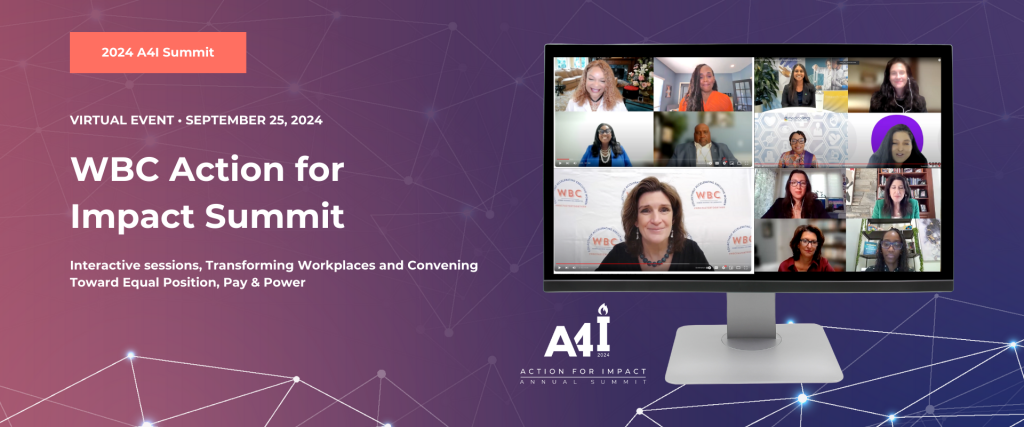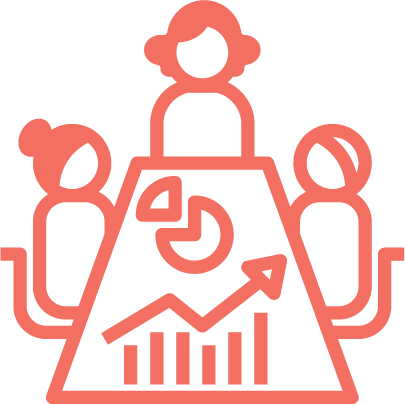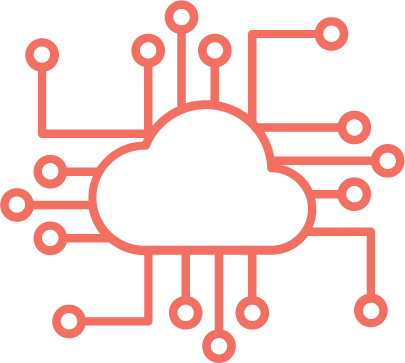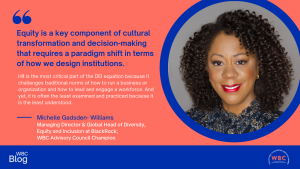The concept of Diversity in the workplace has changed significantly since the start of my career 30+ years ago. Diversity of yesteryear was akin to affirmative action – a headcount exercise or representation. Many of the diversity strategies, policies, and programs at that time emphasized the differences between employees rather than the ties that bind them. In recent years, the focus has shifted toward inclusion which emphasizes the creation of corporate cultures that embrace our uniqueness as individuals and, more importantly, that we foreground treating each other with dignity, mutual respect, and shape cultures of belonging.
Today’s diversity practice – what I call Diversity 3.0 – incorporates the concept of Equity, which (in my words) is about reexamining policies, practices, and programming to ensure equal treatment in the workplace, fair access to advancement opportunities, and fair outcomes for all employees. It also means acknowledging that there is a historical context for under-represented individuals of less privileged backgrounds -like women and women of color- who oftentimes do not enter an organization with the same resources and support systems as their counterparts. Women of color, for example, have a lack of information to rise to the C-Suite.
Equity is a key component of cultural transformation and decision-making that requires a paradigm shift in terms of how we design institutions. It is the most critical part of the DEI equation because it challenges traditional norms of how to run a business or organization and how to lead and engage a workforce. And yet, it is often the least examined and practiced because it is the least understood.
There are actionable steps to approach Equity within any organization’s DEI strategy.
The three steps are:
- Know where you stand
- Be prepared to have difficult conversations
- Ensure leadership at the top is committed and engaged
- Know where you stand
The first step is to conduct a diagnostic assessment to get a sense of the current state of play. To address equity, you need to take a hard look at your policies, practices, and programming to reconcile where you fall short in meeting equity standards.
At BlackRock, we recently signed on to do an independent DEI/Racial Equity Assessment where a third-party will review our strategy to assess how it is impacting the firm’s key stakeholders – our workforce, our clients, and the communities that we serve.
Engaging in this type of hard, self-assessment is essential to gaining the insights needed to foster transparency and hold ourselves accountable to a higher standard. It will increase trust with employees, clients, and communities over the long term and is crucial for an organization to continue to grow and improve.
- Be prepared to have difficult conversations
Second, you must be prepared to have candid conversations around difficult topics such as race and gender. More than ever before, people are attuned to instances of race and social injustice inside and outside of the workplace, and if you aren’t talking about these issues, then you aren’t going to be taken seriously.
At BlackRock, to facilitate regular dialogue on such issues, we launched a speaker series, called “Learning Out Loud” featuring academicians, thought leaders, and other leading experts on a myriad of topics tackling systemic racial inequality. We’ve also begun to host “Inclusion Dialogues” – small group conversations led by external facilitators that help build the skills necessary to cultivate inclusive environments. The conversations can, at times, be difficult because they are meant to bring awareness to behaviors of non-inclusion or actions of microaggression.
When faced with hard problems, I often say that we should run towards the fire – not away from it. That’s when the most growth happens.
- Ensure leadership at the top is committed and engaged
Third, the first two steps are only going to work if you have a strong commitment from the top. When discussing this work with CEO’s and other leaders, I typically look for three things: The courage to act, the commitment to lead, and the conviction to change. If one of those three things are missing, then I tend to look the other way.
I came to BlackRock primarily because I saw the courage, conviction, and commitment from leadership to roll up their sleeves to do this work. Enabled by strong leadership over the past year, we have made significant progress in adopting equity into our comprehensive DEI strategy. We have increased our supplier and vendor diversity efforts to ensure that women and minority-owned business have their fair share of wallet, invested in undercapitalized communities through our social impact work, and continue to be a vocal advocate for increased transparency and disclosure by publicly disclosing our representation numbers.
The “E” in DEI is the newcomer to this practice and it’s the most critical part of the DEI equation because it’s the consistent “red thread” of Diversity and Inclusion.
If we fail to get this right, we will revert to the diversity practices of years past where representation is the key performance indicator.
For a collection of DEI training, leadership, and mentoring programs from WBC partner organizations, check out the Resources for Parity Guide.
Check out Michelle Gadsden Williams on the Diversity Across the Pipeline – Women of Color Leading the Charge Panel from the 2021 WBC Summit!
-
Michelle Gadsden-Williams is the Managing Director and Global Head of Diversity, Equity and Inclusion for BlackRock. She is an award-winning global diversity executive, author, activist, producer and philanthropist with more than 25 years of experience as an advocate for equality within corporate America and a thought leader around diversity and inclusion. Michelle is a seasoned diversity practitioner with experience working in the consumer goods, pharmaceutical and financial services industries before transitioning to professional services in 2017.
Michelle is the former, Managing Director of Inclusion & Diversity for Accenture North America. She provided strategic direction, thought leadership and championed the development of an inclusive environment by integrating diversity practice into all aspects of the business. She has held positions of global responsibility in the diversity management arena by living in Switzerland for close to 10 years of her corporate career and managed staffing functions for large multinational corporations such as Credit Suisse, Novartis and Merck & Co, Inc. Prior to her tenure at Merck & Co., Inc, Michelle has also held positions in Human Resources and Product Development at PhilipsVan Heusen Corporation and Wakefern Food Corporation, both headquartered in New Jersey.
Michelle has acquired a multitude of community service awards and accolades for her work as a diversity practitioner. She has been recognized by Black Enterprise as one of the Top Executives in Corporate Diversity for 2019, 2018, 2017. The Reverend Al Sharpton recognized Michelle as a 2016 honoree at the National Action Network “Woman of Power” Luncheon, an honoree at the Black Institute Awards Gala in NYC and a 2015 Ebony Magazine Power 100 honoree. Throughout her career, Michelle has been profiled in Black Enterprise Magazine, DiversityInc, Diversity Executive, Ebony, Essence, Fortune, History Makers, Heart & Soul, Jet, New Vision, Science Magazine, Sister to Sister, The New York Times, The Wall Street Journal, Target Market News and was recognized as one of 40 Outstanding Executives Under 40 in America in 2006 by the Network Journal. Her other notable tributes include: being named the 2010 recipient of the Maya Way Award for Diversity Leadership by the incomparable Dr. Maya Angelou, receiving the 2008 Harvard Black Men’s Forum Businesswoman of the Year Award, accepting the Rainbow Push Coalition’s Bridge Builder Award by the honorable Reverend Jesse L. Jackson and also being recognized with an honorary Doctorate of Humane Letters degree from Kean University for her outstanding personal and professional accomplishments in the field of diversity and inclusion. In 2013 Michelle was appointed as a member of the Global Advisory Council on Gender Parity for the World Economic Forum in Davos, Switzerland.
Michelle earned a B.S. in Marketing, a B.A. in Communications from Kean College of New Jersey and an M.S. in Organizational Dynamics from the University of Pennsylvania. She is a proud member of Alpha Kappa Alpha Sorority Incorporated and the Executive Leadership Council. Michelle serves on several boards including the Jackie Robinson Foundation, The Art Center in Pasadena, CA and a member of the Women’s Leadership Board of the John F. Kennedy School of Government at Harvard University. Michelle and her husband, David Jamal Williams, live in New York City.
View all posts









